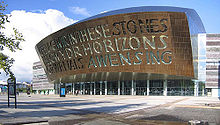Welsh National Opera

Welsh National Opera (WNO) is an opera company founded in Cardiff, Wales in 1946. The WNO tours Wales, the United Kingdom and the rest of the world extensively. Annually, it gives more than 120 performances of eight main stage operas to a combined audience of around 150,000 people. It gives regular performances in Cardiff, Llandudno, and Swansea in Wales, and Bristol, Birmingham, Liverpool, Milton Keynes, Oxford, Plymouth, and Southampton in England. Because the number of performances in England exceeds the number in Wales, Arts Council England is the company's largest source of grant funding, ahead of the Arts Council of Wales.
Although productions were initially sung in English translation, from the 1970s onwards, operas were increasingly sung in the original languages; not only Italian, German and French, but also Russian and Czech. Surtitles were also provided.
In 1985, the company commissioned the play-with-music After Aida from remowned playwright Julian Mitchell, originally as a vehicle for the company's touring season to far-flung Welsh towns which had smaller theatres than the average opera house. The play starred Richard Griffiths and Ian Charleson and included a rotating cast of 12 WNO singers. It eventually transferred to London's Old Vic Theatre.

The Company has always provided a mix of traditional and less-well-known operas, including those of Alban Berg, Richard Strauss, Leoš Janáček and Benjamin Britten.
In 2004, WNO acquired its first permanent home in Cardiff in the Wales Millennium Centre, a performing arts centre in Cardiff Bay.[1]
The opera company consists of a professional orchestra (The Orchestra of Welsh National Opera) and a professional choir (The Chorus of Welsh National Opera). Sometimes, the orchestra and the choir perform at events independently of one another. The orchestra and the choir often perform at St David's Hall in Cardiff and at other venues throughout Wales.
Past WNO music directors have included Vilém Tauský, Warwick Braithwaite, Sir Richard Armstrong and Sir Charles Mackerras. Carlo Rizzi was music director from 1992 to 2001. Tugan Sokhiev became music director in 2003, initially with a five-year contract. However, Sokhiev terminated his contract in August 2004, after concerns about his relative inexperience and difficulties with the administration caused tension within WNO.[2] Rizzi returned as WNO music director for his second tenure, and served in the post through the end of the 2007 summer season.[3][4] In July 2008, WNO announced the appointment of the German conductor Lothar Koenigs as WNO's next music director, effective in 2009. He had first appeared with the WNO orchestra in 2005.[5] Koenigs had subsequently conducted at WNO in February 2007 in David Pountney's production of Khovanshchina.
Music Directors
- Vilém Tauský (1951-1956)[6]
- Warwick Braithwaite (1956–1960)
- Sir Charles Groves (1961–1963)
- Bryan Balkwill (1963–1967)
- Sir Richard Armstrong (1973–1986)
- Sir Charles Mackerras (1987–1992)
- Carlo Rizzi (1992–2001)
- Tugan Sokhiev (2003–2004)
- Carlo Rizzi (2004–2007)
- Lothar Koenigs (2009-present)
See also
References
- ^ Charlotte Higgins (2005-02-21). "Welsh opera has a home at last". The Guardian. Retrieved 2008-12-06.
- ^ Charlotte Higgins (2004-08-21). "Welsh National Opera's music director quits after discord in company". The Guardian. Retrieved 2008-12-06.
- ^ James Inverne, "Carlo Rizzi resigns as music director of WNO - again". Gramophone, 9 May 2007.
- ^ Vivien Schweitzer (2007-05-09). "Welsh National Opera Music Director Steps Down for Second Time". Playbill Arts. Retrieved 2007-05-12.
- ^ "German appointed WNO musical director". Cardiff What's On. 2008-07-20. Retrieved 2008-12-06.
- ^ Graham Melville-Mason (19 March 2004). "Obituaries: Vilem Tausky". The Independent. Retrieved 2009-10-10.
External links
- Welsh National Opera
- Wales Millennium Centre: Home to WNO
- Welsh National Opera Theatre Breaks
- "The First Digital Tristan - a talk with the Maestro, the Hero and the Boss" by Bruce Duffie. Wagner News, February, 1982.
